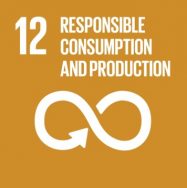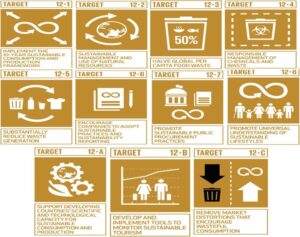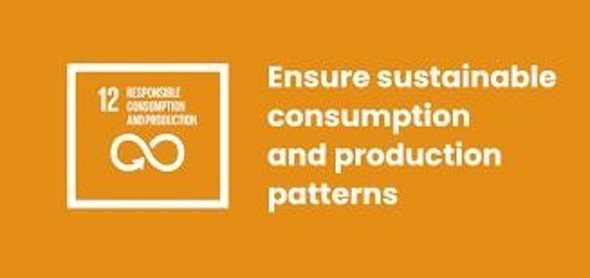Sustainable Development Goal 12. Responsible Consumption and Production

Responsible consumption and production
Worldwide consumption and production rest on the use of the natural environment and resources in a way that continues to have destructive impacts on the planet. Economic and social progress over the last century has been accompanied by environmental degradation that is endangering the very systems on which our future development depends.
Sustainable Development Goal 12 (SDG 12 or Global Goal 12), titled “responsible consumption and production”, is one of the 17 Sustainable Development Goals established by the United Nations in 2015. The official wording of SDG 12 is “Ensure sustainable consumption and production patterns”.
SDG 12 is meant to ensure good use of resources, improving energy efficiency, sustainable infrastructure, and providing access to basic services, green and decent jobs and ensuring a better quality of life for all.
SDG 12 has 11 targets to be achieved by at least 2030 and progress toward the targets is measured using 13 indicators:
12.1 Implement the 10-year framework of programmes on sustainable consumption and production, all countries taking action, with developed countries taking the lead, taking into account the development and capabilities of developing countries.
12.2 By 2030, achieve the sustainable management and efficient use of natural resources.
12.3 By 2030, halve per capita global food waste at the retail and consumer levels and reduce food losses along production and supply chains, including post-harvest losses.
12.4 By 2020, achieve the environmentally sound management of chemicals and all wastes throughout their life cycle, in accordance with agreed international frameworks, and significantly reduce their release to air, water and soil in order to minimize their adverse impacts on human health and the environment.
12.5 By 2030, substantially reduce waste generation through prevention, reduction, recycling and reuse.
12.6 Encourage companies, especially large and transnational companies, to adopt sustainable practices and to integrate sustainability information into their reporting cycle.
12.7 Promote public procurement practices that are sustainable, in accordance with national policies and priorities.
12.8 By 2030, ensure that people everywhere have the relevant information and awareness for sustainable development and lifestyles in harmony with nature.
12.A Support developing countries to strengthen their scientific and technological capacity to move towards more sustainable patterns of consumption and production.
12.B Develop and implement tools to monitor sustainable development impacts for sustainable tourism that creates jobs and promotes local culture and products.
12.C Rationalize inefficient fossil-fuel subsidies that encourage wasteful consumption by removing market distortions, in accordance with national circumstances, including by restructuring taxation and phasing out those harmful subsidies, where they exist, to reflect their environmental impacts, taking fully into account the specific needs and conditions of developing countries and minimizing the possible adverse impacts on their development in a manner that protects the poor and the affected communities.
Sustainable consumption and production aims at “doing more and better with less,” increasing net welfare gains from economic activities by reducing resource use, degradation, and pollution, while increasing the quality of life.
Achieving sustainable consumption and production patterns secures efficiency and productivity gains, ensuring that human activities remain within the carrying capacity of the planet, while respecting the rights of future generations.
What needs to change?
Reducing food loss and waste can contribute to environmental sustainability by lowering production costs and increasing the efficiency of food systems.
How can I help as a business?
It’s in businesses’ interest to find new solutions that enable sustainable consumption and production patterns. Innovation and design solutions can both enable and inspire individuals to lead more sustainable lifestyles, reducing impacts and improving well-being.
How can I help as a consumer?
There are two main ways to help: reducing your waste and being thoughtful about what you buy and choosing a sustainable option whenever possible. Ensure you don’t throw away food, and reduce your consumption of plastic.
1.COVID-19
2.Globalization
Globalization has been increasingly recognized to have a role in the achievement of sustainable development.
Firstly, globalization has changed people’s eating habits and dietary patterns.
Secondly, the food supply chain is greatly lengthened under globalization, consequently, food supply chain management issues continue to rise and greatly contribute to food loss.
Thirdly, globalization has made international trading more competitive and has a huge impact on the domestic economy and production mode
How can we address this?
Sustainable consumption and production is about promoting resource and energy efficiency, sustainable infrastructure. It requires a systemic approach and co-operation among actors operating in the supply chain, from producer to final consumer.
It involves engaging consumers through awareness-raising and education on sustainable consumption and lifestyles, providing consumers with adequate information through standards and labelling and engagement in sustainable public procurement.
It will involve a new global partnership between business, consumers, policy makers, researchers, scientists, retailers, the media, and development co-operation agencies.
Links to other Sustainable Development Goals
Achieving SDG 12 will contribute to the achievement of the other SDGs in a direct or indirect way. SDG 12 has targets related to SDG 2, SDG 3, SDG 4, SDG 8, SDG 9, SDG 13, SDG 14 and SDG 15.
With proper policy support, growing diversity is the foundation for dietary diversity and hence health and nutrition (SDG 2, 3), for resilience to biotic and abiotic stressors (SDG 13 and SDG 15) and should further decent employment (SDG 8) and rural livelihoods (SDG 1). Furthermore, achieving SDG 12 requires constraining industrial agriculture because of its negative impacts on other SDGs, including SDG 6, because it is the largest user of freshwater resources; SDG 2 and SDG 15 because they are chief drivers of biological diversity loss; SDG 7 because of its dependence on fossil fuels; SDG 14 because of pesticide and fertilizer run-off, polluting land and water and creating dead zones in the seas; and SDG 13 because it is a major contributor to greenhouse gas emissions.
References:
- United Nations (2017) Resolution adopted by the General Assembly on 6 July 2017Work of the Statistical Commission pertaining to the 2030 Agenda for Sustainable Development, https://undocs.org/Home/Mobile?FinalSymbol=A%2FRES%2F71%2F313&Language=E&DeviceType=Mobile&LangRequested=False
- “Sustainable Consumption and Production: A Crucial Goal for Sustainable Development—Reflections on the Spanish SDG Implementation Report“, Journal of Sustainability Research. 1 (2). 2019, https://sustainability.hapres.com/htmls/JSR_1120_Detail.html
- Environment, U. N. (2017-10-02). “GOAL 12: Sustainable consumption and production”. UNEP – UN Environment Programme. Retrieved 2020-09-05, https://www.unep.org/explore-topics/sustainable-development-goals/why-do-sustainable-development-goals-matter/goal-12
- Thyberg, Krista L.; Tonjes, David J. (January 2016). “Drivers of food waste and their implications for sustainable policy development”. Resources, Conservation and Recycling. 106: 110–123, https://www.sciencedirect.com/science/article/abs/pii/S0921344915301439?via%3Dihub
- Industrial Ecology in Support of Sustainable Development Goals (2022) Part of the Encyclopedia of the UN Sustainable Development Goals book series (ENUNSDG), Usama Awan, https://link.springer.com/referenceworkentry/10.1007/978-3-319-95726-5_18
- “Advancing the 2030 Agenda: Interlinkages and Common Themes at the HLPF 2018” (PDF). UN Sustainable Development. P. 30. Retrieved 15 September 2020.
Resources:
On these links you can find more information about SDG 12:
- https://www.un.org/sustainabledevelopment/sustainable-consumption-production/
- https://www.unep.org/explore-topics/sustainable-development-goals/why-do-sustainable-development-goals-matter/goal-12
- https://sdg-tracker.org/sustainable-consumption-production
- https://www.globalgoals.org/goals/12-responsible-consumption-and-production/
- https://www.undp.org/tag/goal-12-responsible-consumption-and-production
- https://ec.europa.eu/eurostat/web/sdi/responsible-consumption-and-production




